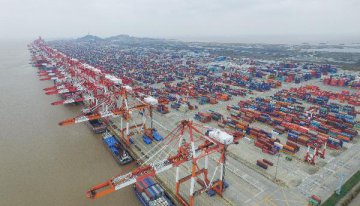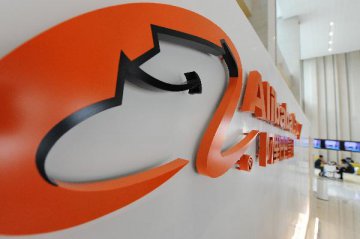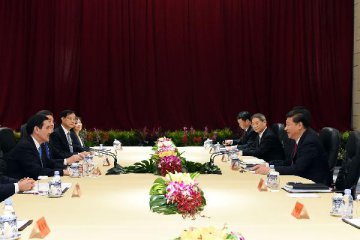
Chinese foreign trade enterprises still need transformation and upgrading and target high-end products, despite the recent yuan depreciation against the U.S. dollar at the end of 2015 and in the beginning of 2016, said analysts.
--- Yuan depreciation's effect on export limited
The yuan depreciation is good news in theory to the foreign trade enterprises. But it is too early to jump to the conclusion, said a head of an enterprise exporting daily necessities in Yiwu city in east China's Zhejiang Province. Data from the General Administration of Customs shows that in dollar-denominated terms, China's exports fell by 11.2 percent from a year earlier in January, worsening from December's 1.4 percent decline.
The import decline also widened to 18.8 percent. The monthly foreign trade surplus widened 12.2 percent year on year to a record high of 406.2 billion yuan in January, up from 382 billion yuan a month earlier. After all, the whole environment is not cheerful. As a matter of fact, the power of consumption on the overseas markets is the key. Therefore, they should not rely on the yuan depreciation to drive up exports, said the head of the Yiwu enterprise. The export decline is due to the sluggish global economy. It also shows the weak role of the yuan depreciation in promoting exports, said Ren Zeping, an analyst with Guotai Junan Securities.
--- Long-term appreciation trend continues with more bilateral moves
The recent depreciation of China's yuan against the U.S. dollar is periodical and the long-term appreciation trend will not reverse, according to Zong Liang, deputy head of the International Financial Research Institute of Bank of China (BOC) on Wednesday. The appreciation of China's yuan is helpful to promote the RMB internationalization progress and the periodical depreciation will help repair the market competitiveness.
The unilateral appreciation or unilateral depreciation is not in the interest of China and the global, said Zong. Meanwhile, Zhou Xiaochuan, governor of the People's Bank of China (PBOC), China's central bank, said earlier this week that there is no basis for the continued depreciation of the yuan and China would not let market sentiment be dominated by speculative forces.
On Monday, the central parity rate of the yuan against the U.S. dollar strengthened by 196 basis points to 6.5118, reversing drops in January, when the market was permeated by depreciation talk. Pressure has been eased due to sharp declines in the U.S. dollar index and weakening expectation, since the beginning of February, of a Federal Reserve rate hike, as the U.S. economy is not as optimistic as earlier predicted. Given the long-term appreciation trend and the economic new normal, the foreign trade enterprises in China still need to increase efforts in transformation and upgrading, said analysts.
--- Preventing exchange risk while accelerating upgrading
Nowadays, a lot of foreign trade enterprises are used to adopting a series of methods such as import hedging and forward exchange transaction to cope with the exchange risk. Zong also suggested that China should develop the foreign exchange futures market as the low-cost futures transactions will benefit more small-and-medium-sized foreign trade enterprises. Since the second half of 2015, under the circumstances of a slowdown in China's economic growth, RMB exchange rate has become more volatile, adding the exchange risk to the foreign trade enterprises.
After RMB's inclusion in the International Monetary Fund's Special Drawing Rights (SDR) basket of currencies, the RMB exchange rate will become more market-oriented. Product competitiveness remains crucial in the export trade. On the one hand, the domestic foreign trade enterprises have to actively use the financial methods such as derivatives and futures contracts to lock the exchange risk and ensure their profits, and on the other hand, they have to quicken the pace to move towards the high-end manufacturing field and enhance added value of their products, said analysts. (Contributed by Yang Qi, Hu Pingchao, hupingchao@xinhua.org)
























Latest comments